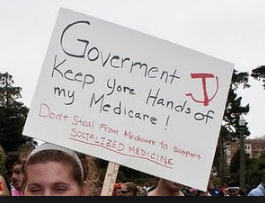MFA/M4A uses Medicare as the health insurance mechanism for people younger than 65. Some advocates are pitching “Medicare for Some” wherein folks older than 50 or 55 would be able to “buy-in” to Medicare (which covers everyone over 65 today).
Here are some of the reasons supporters like MFA:
- Overall healthcare costs would be lower, reducing expenses for employers, individuals, and taxpayers over time.
- Current beneficiaries really like Medicare – more than insureds like private insurance
- It relies on an existing system and infrastructure that exist today and are familiar to all stakeholders
- Administrative expenses are much lower than employer-sponsored and individual insurance
- Price controls are universal and apply to almost all types of providers
- Cost increases – on a per-capita basis – are lower than in commercial health insurance
- Pretty much all doctors and hospitals accept Medicare
- Commercial insurers are very active in Medicare, offering plans that provide added benefits for little to no additional cost (however there are usually limits on providers patients can use (known as Medicare Advantage plans)
- Those who like “traditional” Medicare can buy supplemental benefits from private insurers to cover services, deductibles, copays and other costs not covered by Medicare (Medicare Supplement plans)
Opponents cite:
- It would be wildly expensive and require massive new taxes, with annual cost estimates ranging from $1.4 to $2.8 trillion (although one major opponent concedes total US healthcare costs would be $2 trillion less a decade into MFA)
- Medicare reimbursement is too low, forcing providers to upcharge other payers to make up for lost revenue. If Medicare is the only insurance carrier, then providers will be in dire financial straits.
- People covered by employer-funded health insurance are leery of losing those plans.
- MFA would severely limit or restrict “choice” of health plans and coverage options
- The notion of “government-run” healthcare scares some, but most don’t even know Medicare IS a “government-run” program.

My take
There’s no question Medicare is less expensive than group/individual health insurance – and costs will increase more slowly. Private insurers are heavily invested in the business, so they can handle the admin piece. Yes, taxes would go up, but employers’ costs would likely drop considerably. Patient hassles would greatly diminish.
Oh, and given what a pain in the butt commercial insurers can be when it comes to out of area coverage, deductibles, annual premium increases, covered v non-covered services and everything else they do to make our lives miserable, I’d be way happier with Medicare for me and my wonderful bride.



One concern I have with universal health plans, and I believe that M4All has this issue, is that the plan typically involves that which sunk the single payer proposal for Vermont, which is the introduction of plans with high actuarial values and high subsidies to make sure that people can afford the plan. I read the other day that 45% of Americans have affordability problems with health insurance, which is the same percentage from over a decade ago. The adjustments required to meet ambitious goals of affordability – don’t they do huge damage to the political acceptance of M4All. Can the adjustments be implemented over a long time (say 8 years)?
Hello Peter – the difference here is using Medicare fee schedules greatly reduces the price per service of care, which would address the key cost difference between Medicare and commercial plans.
Also Medicare has a series of deductibles, copays and the like which would almost certainly be subject to alteration under anu MFA-type universal coverage.
I agree with all you state Joe. I would rather deal with government incompetence than greedy commercial insurance (CI) companies who are deliberate and sly in their actions. What I mean is the conglomerates from Wall Street deliberately set policies and rules that they know overly burden providers just in order to get paid pennies on the dollar for the service. The Medicare fee schedule is generally fair (but does need work) and is set by a formula that takes into account provider costs. And like many government run programs their are many inefficiencies and redundancies that would need to be cleaned up.
Thanks Mark. I agree that this is one of those lesser of several evils things. That said the profit motive is rather more problematic than government ineptitude.